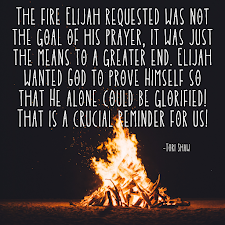The Goal of Prayer
"Immediately the fire of the Lord flashed down from heaven and burned up the young bull, the wood, the stones, and the dust. It even licked up all the water in the trench! And when all the people saw it, they fell face down on the ground and cried out, “The Lord—he is God! Yes, the Lord is God!” 1 Kings 18:36-39 (NLT)
After three years of drought and famine (that Elijiah had warned King Ahab of), God instructed Elijiah to return to the king and tell him that rain would soon come. During his conversation with King Ahab, Elijiah challenged the king to a dual of sorts, between God and the gods that King Ahab and Jezebel had been encouraging the people to worship.
Imagine being Elijah, stepping forward, setting yourself apart from crowds Ba'al worshippers and half-hearted God-followers, and calling upon God to send fire from heaven to burn up a sacrifice that was drenched in water. He had instructed the Ba'al worshippers and then observed them shout, dance, sing, cut themselves, and beg their god all day long to send fire but nothing happened. Now, it was his turn. All by himself, with no fancy language or ritualistic activities, he simply asked the Lord to prove who He was the God of Israel.
1 Kings 18:36-27 (NLT) says, "At the usual time for offering the evening sacrifice, Elijah the prophet walked up to the altar and prayed, “O Lord, God of Abraham, Isaac, and Jacob, prove today that you are God in Israel and that I am your servant. Prove that I have done all this at your command. O Lord, answer me! Answer me so these people will know that you, O Lord, are God and that you have brought them back to yourself."
Elijah's bold faith and certainty in the God of Israel had come from years of experiencing God's provision while living by a brook in Cherith, witnessing the ravens bring him food twice a day and then in Zarephath where a poor widow would provide for him. He observed while God caused an almost empty jar of oil never go dry and a container of flour be continuously refilled. God even used Elijah to raise a young boy from the dead.
Elijah knew he didn't need to sing an impressive song, do a dance, harm himself physically, or beg God to come through for him. He knew that God simply required a trusting heart that had the right motivation.
The fire Elijah requested was not the goal of his prayer, it was just the means to a greater end. Elijah wanted God to prove Himself so that He alone could be glorified! That is a crucial reminder for us! Our prayers needn't be lengthy or perfect or even laced with extravagant words. Prayer is always about our heart posture. Even when we're bringing the most basic of needs to the Father, our prayers need to be focused on Him, not ourselves or our needs. We never need to panic or beg because our God knows what we need before we even ask.
The ultimate goal of our prayers should always be for God to be exalted, for our relationship with Him to grow and be solidified, and for other's hearts to turn towards Him. Even in the most difficult situations, we should desire those things above all else. That doesn't come naturally, but just like Elijah, the more we witness God come through for us and those around us, we will grow in confidence and become more and more willing to set ourselves apart, ask God to prove Himself so that others might turn toward Him or begin trusting Him more.
Considering that, we may need to examine our prayer lives, and in some cases, restructure our requests so that they are focused on the all-powerful God and not ourselves, come from a heart that trust in God's faithfulness, and ask our Heavenly Father to ultimately do whatever will make Himself known to others. May our prayers reveal a heart that desires for God to be exalted!
Tori



Comments
Post a Comment
Please take the time to leave an encouraging message